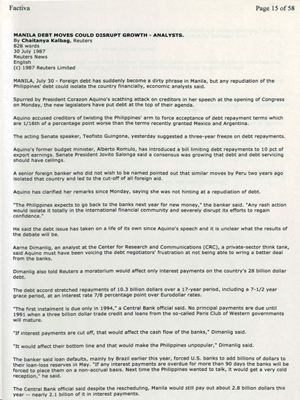MANILA DEBT MOVES COULD DISRUPT GROWTH – ANALYSTS
[Reuters]
Published date: 30th Jul 1987
30 July 1987
Reuters news
(c) 1987 Reuters Limited
MANILA, July 30 – Foreign debt has suddenly become a dirty phrase in Manila, but any repudiation of the Philippines’ debt could isolate the country financially, economic analysts said.
Spurred by President Corazon Aquino’s scathing attack on creditors in her speech at the opening of Congress on Monday, the new legislators have put debt at the top of their agenda.
Aquino accused creditors of twisting the Philippines’ arm to force acceptance of debt repayment terms which are l/16th of a percentage point worse than the terms recently granted Mexico and Argentina.
The acting Senate speaker, Teofisto Guingona, yesterday suggested a three-year freeze on debt repayments.
Aquino’s former budget minister, Alberto Romulo, has introduced a bill limiting debt repayments to 10 pct of export earnings. Senate President Jovita Salonga said a consensus was growing that debt and debt servicing should have ceilings.
A senior foreign banker who did not wish to be named pointed out that similar moves by Peru two years ago isolated that country and led to the cut-off of all foreign aid.
Aquino has clarified her remarks since Monday, saying she was not hinting at a repudiation of debt.
“The Philippines expects to go back to the banks next year for new money,” the banker said. “Any rash action would isolate it totally in the international financial community and severely disrupt its efforts to regain confidence.”
He said the debt issue has taken on a life of its own since Aquino’s speech and it is unclear what the results of the debate will be.
Aarne Dimanlig, an analyst at the Center for Research and Communications (CRC), a private-sector think tank, said Aquino must have been voicing the debt negotiators’ frustration at not being able to wring a better deal from the banks.
Dimanlig also told Reuters a moratorium would affect only interest payments on the country‘s 28 billion dollar debt.
The debt accord stretched repayments of 10.3 billion dollars over a 17-year period, including a 7-1/2 year grace period, at an interest rate 7/8 percentage point over Eurodollar rates.
“The first instalment is due only in 1994,” a Central Bank official said. No principal payments are due until 1991 when a three billion dollar trade credit and loans from the so-called Paris Club of Western governments will mature.
“If interest payments are cut off, that would affect the cash flow of the banks,” Dimanlig said.
“It would affect their bottom line and that would make the Philippines unpopular,” Dimanlig said.
The banker said loan defaults, mainly by Brazil earlier this year, forced U.S. banks to add billions of dollars to their loan-loss reserves in May. “If any interest payments are overdue for more than 90 days the banks will be forced to place them on a non-accrual basis. Next time the Philippines wanted to talk, it would get a very cold reception,” he said.
The Central Bank official said despite the rescheduling, Manila would still pay out about 2.8 billion dollars this year — nearly 2.1 billion of it in interest payments.
The Central Bank official noted that loans from multilateral institutions were non-negotiable.
“In the next six years, we shall have to pay 20.1 billion dollars to our official and private creditors,” Aquino said in her speech. “The bottom line … is that we have been left little room for domestic error.”
The banker said the speech was a “smart political move.”
“It allowed Aquino to emerge clean from the debt restructuring process and mollified cabinet members who have advocated a hard line but were held back by Finance Secretary Jaime Ongpin,” he said.
Ongpin has repeatedly argued that debt repudiation would be unwise but Aquino’s outburst appears to have touched a responsive chord.
Newspaper editorials today hailed her speech, saying the nation deserves an explanation of how the debt was accumulated by former president Ferdinand Marcos. “If this were Communist Russia, Ongpin and Central Bank Governor Jose Fernandez would be in Siberia by now,” one columnist wrote.
Fernandez told the Manila Chronicle in an interview that the debt pact would allow the Philippines to “absorb the excesses of the past.”
“We have no principal payments to make for seven and a half years — that is elbow room,” Fernandez said. Asked about the better terms obtained by Mexico and Argentina, he replied “You must look at the broad, panoramic landscape where out of 20 countries that have restructured, you have only two that have gotten 1/16th better than we.”
The foreign banker said Ongpin and Fernandez would likely be casualties in the fall-out from Aquino’s speech. Both said the accord was good, and now Aquino has said it was forced on the country. “It would be surprising if that isn’t interpreted as a no-confidence vote by many people, especially Congress.”






